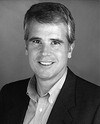 Author of Stigma (2007)
Author of Stigma (2007)
February 26, 2007
By David J. Montgomery
Philip Hawley, Jr. is a
pediatrician in Los Angeles who drew on his experience volunteering among remote
Indian tribes in Central America to writes his debut novel, Stigma. He is
also one of the most-promising new thriller writers to come along in quite a
while.
Q. You already have a successful career as a pediatrician at a prestigious
children's hospital in Los Angeles. What made you want to be a writer? Temporary
insanity?
A. Looking back, yes, there was a moment of insanity.
It came when I was re-reading Robert Ludlum's The Matarese Circle and I
thought, "Hey, I can do this. I can write a thriller novel!" Of course, the
naiveté and ignorance that allowed me to so grossly underestimate the Mr.
Ludlum's accomplishment also protected me from giving up when a rational and
well-informed appraisal of the soul-smothering challenge that lay ahead might
have caused me to quit before writing the first paragraph.
Q. So after you made the decision to write a book, why did you choose a
thriller?
A. The literary arc of a thriller – especially the
classic scenario of a lone hero in peril, battling to restore order in a chaotic
world besieged by malevolent forces – offers a fertile and seemingly limitless
canvas for storytellers. When done well – that is, when the novelist tells a
dramatic and suspenseful story and introduces me to characters I care about –
the thriller, I think, is the ideal literary form.
Q. Stigma contains detailed information on black ops-type stuff:
tactics, weapons, equipment, etc. Did you do a lot of research – or is there
something in Phil Hawley's past that we should know about?
I've been threatened by a knife-wielding man in a
hospital emergency room, twice accosted by armed gunmen on the streets of Los
Angeles, and once fired upon. Each of these had only to do with random chance,
and my red belt in Tae Kwon Do didn't once prove useful! Only in my boyish
imaginings were there high-stakes global issues at play in these events. In
other words, I have to rely on my overactive imagination – and a modicum of
research – when writing about black ops.
Q. How much of you is there in the character of Luke McKenna (the protagonist of
Stigma)? Do pediatricians often pack heat?
A. Despite rumors started by Paul Guyot, I don't pack
heat. It may surprise your readers to learn that very few baby doctors carry
concealed weapons.
Q. Stigma probes some interesting moral and ethical questions,
particularly with regards to setting limits on medical science. Did you have
these questions in mind when you began to write the story?
A. One question that has concerned me for some time is
this: As science makes possible previously unimaginable medical interventions,
where is the boundary beyond which we should not travel? I didn't set out to
write a novel exploring this question, but, clearly, the issue crept into the
story through my subconscious.
I don't have any special insights concerning this
issue, nor do I offer any solutions. But one thing seems clear – in the very
near future, these issues will force themselves on a global human society that
seems reluctant to deal with them.
Q. What was the most exciting part of having your first novel published?
A. That's an interesting question, because like many
writers I'm not comfortable in the limelight. Even the small amounts of
attention that come my way are somewhat daunting. The "excitement" of publishing
is not something I seek.
However, there have been many pleasurable moments
along the way, and most are quiet ones. Writing "The End," which I did not do
until I'd finished the final rewrites of Stigma, was one of the high
points of this journey.
Without a doubt, the most blissful moments come
when I talk with readers who are genuinely touched by my story – readers who
speak of the story's characters as if they're real people. For me, nothing else
comes close to that experience.
Q. Have you had any thoughts of retiring from medicine to write full-time?
A. No. I love both careers, and in that sense I'm very
lucky. The most difficult challenge is finding the time to give each career what
it demands.
Q. What advice would you give to aspiring writers?
A. I'm still shocked when asked this question. After
all, I've walked only a few paces along the literary path.
Having acknowledged that, the best advice I've
heard is: Write every day and read good books.
Beyond that simple counsel, I'm not certain there
are any universal truths. As Somerset Maugham once said, "There are three rules
for writing the novel. Unfortunately, no one knows what they are."
Q. What's the last book you read?
A. Odd Thomas, by Dean Koontz. Odd Thomas –
what a wonderful character!
Q. What's next for you?
A. Completing book two, which is a sequel to Stigma.
Don't ask me how it ends, though! My stories seem to write themselves in the
subconscious, and I rarely see more than a few scenes ahead.
 Author of Stigma (2007)
Author of Stigma (2007)